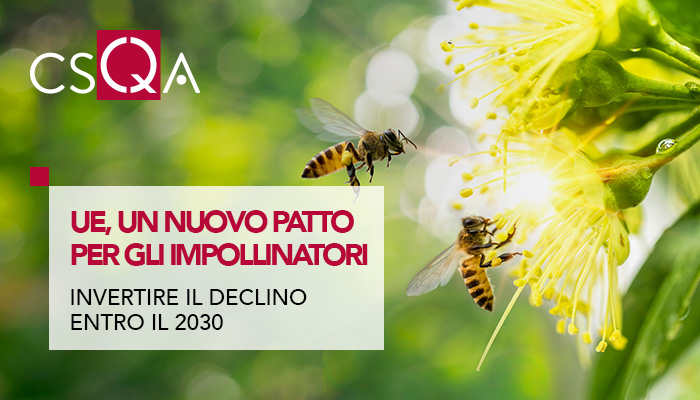
On 24 January, the Commission presented the communication " A new deal for pollinators" to halt the alarming decline of wild insect pollinators in Europe , revising the 2018 EU initiative.
An increasing proportion of the public is calling for decisive action to tackle the loss of pollinators, as evidenced by the success of the European citizens' initiative 'Save the bees and farmers!'
The new version of the initiative sets out the actions that the EU and Member States must take to reverse the decline of pollinators by 2030: to date, in fact, one in three species of bees, butterflies and hoverflies is disappearing.
This initiative complements the Commission's proposal for nature restoration legislation presented in June 2022 and is a cornerstone of the 2030 biodiversity strategy, the farm to fork strategy and the European Green Deal.
The revised Pollinators Initiative sets out a series of 2030 goals and actions by identifying three priorities, the most important of which is to improve pollinator conservation and address the causes of their decline. This objective will be pursued:
- improving the conservation of species and habitats. For example, the Commission will develop conservation plans for threatened pollinator species, identify pollinators typical of habitats protected by the Habitats Directive that Member States should protect and together with Member States design a network of pollinator ecological corridors, or 'Buzz Lines';
- restoring pollinator habitats in agricultural landscapes , in particular through increased support for pollinator-friendly agriculture under the Common Agricultural Policy;
- mitigating the impact of pesticides on pollinators , for example by introducing a legal requirement to implement IPM, or additional test methods to determine the toxicity of pesticides to pollinators, including sublethal and chronic effects. As the excessive use of pesticides is a major cause of pollinator losses, it will be crucial to reduce the risk and use of these products, as set out in the Commission's proposal on the sustainable use of pesticides;
- improving pollinator habitats in urban areas;
- addressing the negative effects climate change, invasive alien species and other threats such as biocides and light pollution have on them .
A final priority is to mobilize society and promote strategic planning and cooperation.
The Commission will support Member States in developing national strategies for pollinators. The Commission and the Member States will also help citizens and businesses to take action, for example by raising public awareness and promoting citizen science.
The full list of actions can be found in the annex of the Communication "A New Deal for Pollinators" .
Pollinators are an integral part of any healthy ecosystem. Without them we would witness the decline and extinction of many plant species and the organisms that depend on them, with serious ecological, social and economic implications. Given that around 80% of crops and wild flora depend on animal pollination, the loss of pollinators is one of the most serious threats to the EU's nature, the well-being of its inhabitants and food security, undermining long-term sustainable agricultural production. The current geopolitical context has made it even more necessary to create a more resilient food system, including by protecting and restoring these insect populations.
The initiative is based on an extensive stakeholder consultation process and comments from the European Parliament, the Council, the Committee of the Regions and the European Court of Auditors and is in line with the recently adopted Kunming-Montréal Global Framework on Biodiversity, which includes a global target of reducing risks from pesticides by at least 50% by 2030. (Source: https://www.confagricoltura.it/ )